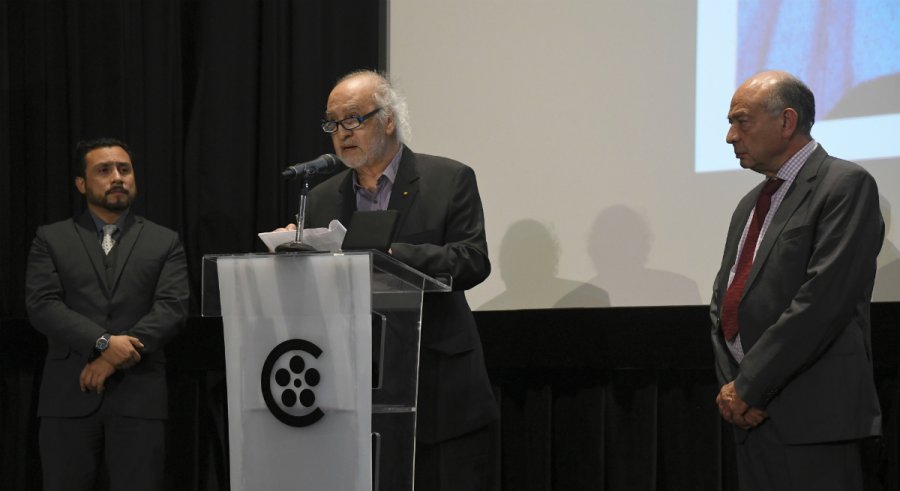Noticias
Latin American cinema is the poorest but also the freest: Miguel Littin
November 09, 2017When he was awarded the 2017 Cineteca Nacional Medal for his five decades of career, the Chilean filmmaker Miguel Littin said that "although Latin American cinema is the poorest, it is the freest".
He said that in our region, although "the cinema lacks technology that entails tyrannies of language, it provides a disordered and creative vision in its way of saying and sometimes, when we dare, its images project unpublished forms of human behavior, constituting a new language, modifying the form and consequently, the content".
Our cinema, he said, has developed a narrative through an unfinished esthetic, because although in the artistic field we have been able to create great works, we have failed in other fields such as politics, with dependent economies, poor democracies, "social shelves that collapse into a perverse domino effect, without possessing the grace and mischief of that game”.
At the award ceremony, held at the Cineteca Nacional, the Chilean reminded filmmakers of his 1960s generation, who tried to see the land to tell it anew, a field in which he explored the depths of the peasant soul, trying to find the man and tell his pulsating story.
It was a generation, he said, that turned cinema into a mission: art and commitment to Latin American men and women, sailing in turbulent waters but with lucidity, where the will was stronger than the technical and material deficiencies, tyrannies and dictatorships.
With neorealism and surrealism, they created a new form, a dialectical sum, a cultural syncretism and an unfinished esthetic, in keeping with the inconclusive nature of our history, so that now, he said, the challenge of the young continent is to innovate, amalgamating tradition and modernity, to generate new social proposals.
Miguel Littin recalled that his years of exile in Mexico marked his existence with fire, broadening his vision of Latin America, so he showed solidarity with our country and spoke out against the wall that US President Donald Trump intends to build.
“Thank you for this great honor” which, he said, gives a new dimension to his work and which “along with the Aztec Eagle, I will proudly carry in my life, until life lasts. To honor honor, thank you Mexico" because our country, "is not my second homeland, it is my other homeland", he said.
The Chilean filmmaker received the Cineteca Nacional Medal from the director of this institution, Alejandro Pelayo, who recalled that Littin was part of the so-called new Latin American cinema, that more than an artistic trend,"was a set of concerns that united various authors, when their people and culture were threatened by acts of enormous cruelty”.
That cinematographic expression was a social protest and Littin was one of its main representatives who for over 50 years has developed the capacities of political cinema within the limits of art, he explained.
At just 26, Miguel Littin recalled his debut, El chacal de Nahueltoro. In our country, where he lived for 10 years in exile, his first movie was Actas de Marusia, where he addressed the martyrdom of a mining community and arrived at the Cannes Film Festival and even won the Oscar nomination for Best Foreign Film.
His extensive production also includes titles such as El recurso del método, La viuda de Montiel, Sandino, Los náufragos, La última luna, Dawson isla 10 and Allende en su laberinto, all of them are inscribed in a cinema that seeks the voice of a continental people.
Alejandro Pelayo pointed out that the preservation and critical perspective of historic memory were two of the fundamental missions of the new Latin American cinema, where Littin has participated with a tireless fervor for five decades of trajectory and a clever technique and art, for which reason he has won the Cineteca Nacional Medal.
As part of this recognition, the Cineteca Nacional will present a retrospective of the Chilean director until November 19th, where the public will be able to enjoy an exhibition of his great production in a large screen.
Mexico,Distrito Federal
